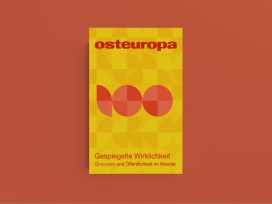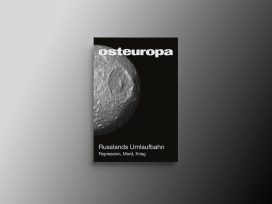Abstracts Osteuropa 3/2006
Lilia Shevtsova
Guaranteed without guarantees. Russia under Putin
Russia’s political development is following a logic that is as paradoxical as it is
frightening. That the ruling class is interested in the stabilization of the existing
order is self-evident. This order, however, can only be consolidated so long as it
remains in motion. Its essence lies in uncertainty. The ruling clique is working vigorously on creating a state that not only poses an enormous danger to Russian society but one that could go out of control. And there is no political force able to prevent Russia from sliding into social disintegration or dictatorship.
Boris Dubin
Simulated power, ceremonial politics. Elements of political culture in Russia
Since the start of the Putin era, the state media in Russia has been staging political ceremonies, simulating the existence of powerful leaders, and outlining threatening scenarios. These kinds of symbolic political productions are supposed to
mobilize solidarity and forge the nation. But it cannot hide the fact that the men at
the pinnacle of the Russian state are weak and irresponsible, that the elite is either officious or paralyzed, and that the population is petrified by fear.
Azär Babayev
A failed test of democracy. Azerbaijan’s 2005 Parliamentary Election
After the democratic departures in Georgia and Ukraine, Azerbaijan’s opposition
linked the November 2005 parliamentary election in its republic to the hope that
something similar to what happened in Tbilisi and Kiev could take place in Baku.
The election was seen by observers as the greatest chance for democracy in
Azerbaijan as well as the last chance for years to come. But all those involved
failed the democracy test: the voters, the political elite, and even the West, which
gave priority to stability over democracy.
Norbert Baas
Building trust, creating stability. The UN and the resolution of the Georgian-Abkhazian conflict
The Georgian-Abkhazian conflict left deep wounds in Georgia and in the Autonomous Republic of Abkhazia. The international community never recognized
Abkhazia’s efforts to secede and remains committed to Georgia’s territorial integrity
and sovereignty in its recognized borders. A resolution to the conflict is being
worked on under the auspices of the United Nations. In the forefront of negotiations
stand confidence building and the return of Georgian refugees and expellees to
Abkhazia, above all to the Gali District. Only when efforts here have met with success will the question of a political solution, including Abkhazia’s status, be raised.
Karin Bachmann
“Reform Tiger” Slovakia. A model for other states?
Slovakia’s image abroad has undergone rapid transformation in recent years. This
young east-central European state, considered “socially unacceptable” by the international community until Slovak voters turned out the Meciar government in 1998, is
seen today as an exemplary model of reform enthusiasm. Above all, the introduction
of a uniform tax rate of 19 percent produces admiration. This reform, however, stems
from very specific structural preconditions and is threatened by political instability.
Ulrich Hofmeister
The Soviet Union as colonial power. Looking back on the case of Uzbekistan
Was the Soviet Union a colonial power? The example of Uzbekistan shows that all
of the characteristics of colonialism apply to Soviet rule in Central Asia. Substantial
differences in the Soviet Union’s practice of colonialism from that of western European
colonial powers are explained by Moscow’s unrelenting determination to integrate
Uzbekistan into the greater Soviet state. In the long term, those efforts failed, and
the Central Asian republics also chose to go down the road of decolonization.
José M. Faraldo
Ad marginem. Historical eastern European studies in Spain
In Spain, eastern European studies has always had a touch of the exotic. Anything having to do with eastern Europe was always left to the margins. Under Franco, it was
obstructed for political reasons. As a result, Spain lacks the kind of interdisciplinary
academic tradition in the field that exists in Germany. In the meantime, however, Spanish research into nationalism, dictatorships, and transformation is making substantial
contributions, and interest in Europe’s east is growing through comparative studies.
Petra Huber
Traitor or mediator? Yosif Brodskii / Joseph Brodsky as cultural double agent
The poet and translator Yosif Brodskii left the Soviet Union in 1972 and was “born
again” as a poet, essayist, and university lecturer in the United States. There, he
continued to compose his poems mostly in Russian, but for his essays, Brodsky
made the switch to his adopted English tongue. Two texts of different genres –
between each of which lies almost all of Brodsky’s time in exile – reveal Brodsky
as a distinct kind of traveller of borderlands, one who moved between cultures,
languages, and genres. Common to both texts is the theme of the writer as spy
and potential traitor to his own culture.
Karlheinz Kasper
“Wagging with models of the universe…” Russian literature in German translation in 2005
In 2005, German translators again performed extraordinary achievements in
translating classic and contemporary works by Russian writers. Ganna-Maria
Braungardt, Annelore Nitschke, Alexander Nitzberg, Andreas Tretner, Dorothea
Trottenberg, and Birgit Veit deserve to be mentioned alongside Peter Urban. Particularly
valuable works were also again on offer from small publishing houses such as
Dörlemann, Engeler, Kein & Aber, Pano, Persona and the journal Schreibheft.
And the number of translated thrillers also remained conspicuously high.
Published 30 March 2006
Original in German
Contributed by Osteuropa © Osteuropa
PDF/PRINTNewsletter
Subscribe to know what’s worth thinking about.



